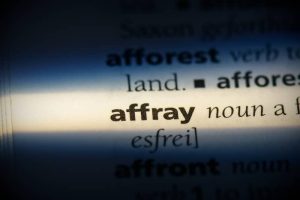If you are accused of fighting or engaging in a public affray in North Carolina, it is important to understand the potential  consequences you may be facing.
consequences you may be facing.
These charges can result in significant penalties, including jail time and fines.
In this blog post, we will provide an overview of the criminal charges associated with fighting and public affray in North Carolina, as well as some tips on what to do if you are charged.
What is Public Affray?
In North Carolina, public affray is defined as a fight between two or more people in a public place that causes alarm or terror to others.
Simple affray can be related to assault and battery charges in North Carolina and may be charged if a fight breaks out. That means you can be arrested or issued a Criminal Summons.
The State carries the Burden of Proof and must prove the prima facie elements of the offense, including:
- You engaged in a fight with another person or persons
- The fight took place in a public setting or public place
- Members of the general public experienced terror because of the fight
Is Public Affray a Misdemeanor or Felony?
Public affray is a misdemeanor offense and is designated as a Class 2 misdemeanor. It is punishable by up to 60 days in jail. 
Even if all the parties involved voluntarily engage in fighting, police in North Carolina can arrest you for a Public Affray.
As you might imagine, there can be related criminal charges that result from a fight, especially if it involves physically injuring another person or the use of a weapon.
Even if a fist fight results in only minor injuries, a warrant may also be issued for Simple Affray in North Carolina.
They do not require medical attention or a doctor’s attention or treatment or serious bodily injury.
Are all fights subject to Simple Affray charges?
A simple affray is a voluntary fight that terrorizes members of the public.
A common example of a Simple Affray in North Carolina is a bar fight. Criminal charges may be brought if parties voluntary engage in the tussle – Danny Glover Jr., OBX
On the other hand, boxing matches, mixed martial arts, and other sporting events that involve a degree of violence and/or fighting ordinarily would not result in criminal charges in North Carolina.
As is the case with many legal matters, there are always exceptions.
It is possible for related criminal charges associated with assault and battery in some instances, particularly if the contact goes well beyond what is ordinarily part of the sport.
Consequences of Public Affray and Fighting Charges 
As we mentioned above, both public affray (fighting) is a misdemeanor offense in North Carolina. However, the penalties for these types of criminal charges can be significant.
Public affray, assault, assault on a female, communicating threats, and injury to personal property are all criminal offenses in North Carolina. A conviction can go on your criminal record, possibly causing problems for you in the future.
A criminal record can have significant negative consequences, including making it difficult to find employment or housing.
The consequences of a conviction can be devestating. Unfortunately, some people don’t think about that type of thing before showing up to court or entering a plea to the charges without a lawyer – Danny Glover Jr, OBX Criminal Lawyer
What To Do If You Are Charged With Public Affray or Fighting?
If you have been charged with public affray or fighting, it is important that you seek legal assistance as soon as possible.
An experienced criminal defense attorney will be able to review the facts of your case and advise you of your legal options.
Call our office today to schedule a consultation with criminal defense lawyer Danny Glover Jr.
We can help you fight these charges and protect your rights.
Take advantage of our FREE CONSULTATION and call or send a text message to Danny Glover Jr. now.
What is considered a Deadly Weapon in NC?
In North Carolina, a deadly weapon is defined as any object that can be used to inflict serious bodily injury or death.
This includes firearms, knives, clubs, and other objects that are not typically considered weapons.
Is “Character Evidence” Admissible to Prove Wrongdoing?
The use of a deadly weapon in the commission of a crime can result in enhanced penalties.
For example, if you are charged with assault with a deadly weapon, you may be facing felony charges.
What is considered a Serious Injury in Criminal Court?
A serious injury may be a type of injury that creates a risk of death that is substantial or that causes disfigurement, impairment of the function of any bodily member or organ, or the protracted loss of a bodily organ or member.
In North Carolina, using a deadly weapon as a part of or “during the commission” of a crime or criminal act can result in enhanced penalties.
When Should You Talk to a Lawyer After Being Arrested for Simple Affray?
Ideally, you should talk to a lawyer before talking to the police. However, this is not always possible or practical with regard to a simple affray.
If you have already been arrested, we believe the best course of action is to exercise your right to remain silent and request to speak with a lawyer and representatives of the law firm as soon as possible.
Do not say anything to the police until you have had a chance to speak with an attorney.
When is the best time to hire a Criminal Defense Lawyer?
If you have been charged with a crime, it is important that you seek legal assistance as soon as possible and establish a formal attorney-client relationship.
Criminal defense lawyers generally prefer to get right to work on cases, review the facts of the allegations, and advise you of your legal options.
Call our office today to schedule a consultation with criminal defense lawyer Danny Glover Jr. We can help you fight these charges and protect your rights.
It is always best to consult with an attorney before taking any legal action. An attorney can assess your individual situation and give you specific advice on how to proceed.
 North Carolina Criminal Law Updates
North Carolina Criminal Law Updates






